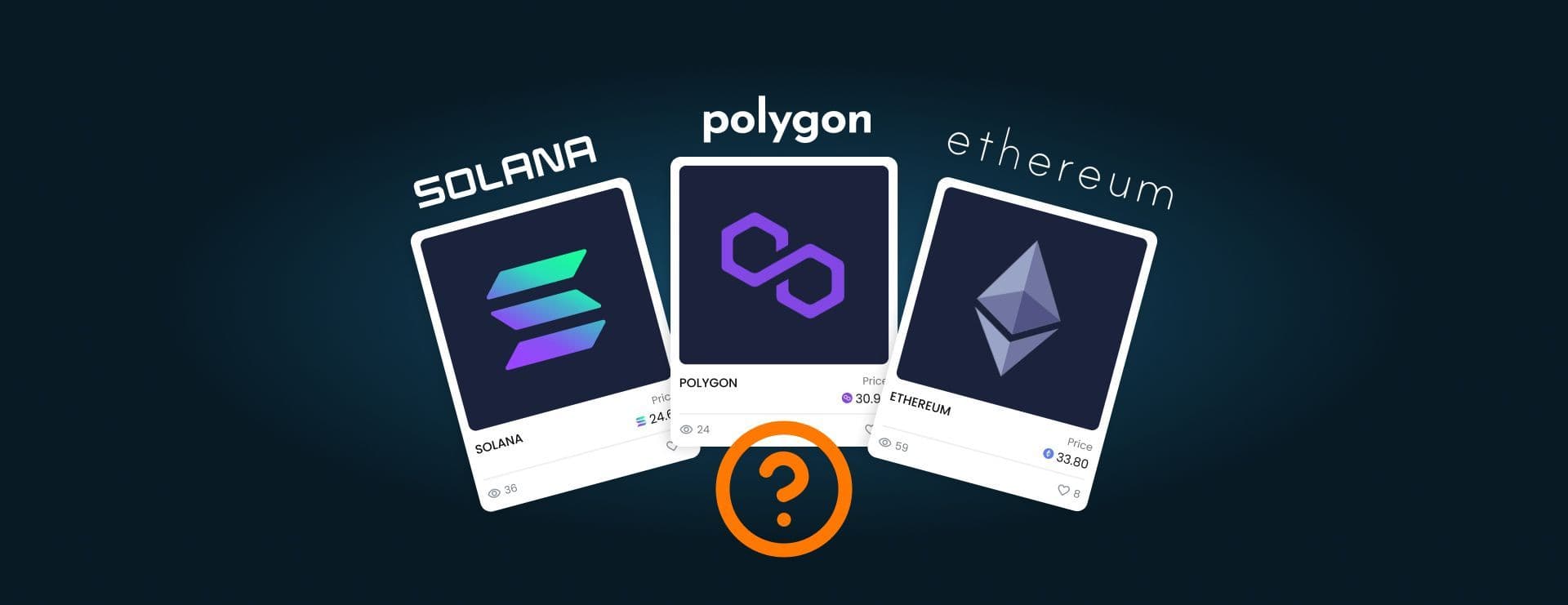You have probably stumbled upon this post because you're thinking about starting a groundbreaking NFT project, or because you are simply intrigued about the subject.
NFT projects have become the talk of the town in the crypto industry in the past two years. The rise of non-fungible tokens (NFTs) has certainly made blockchain technology even more popular than it was before, with people looking at crypto through another, more fun, lens.
But, NFTs aren't just about fun - they have the option to offer a lot of utility to their users and creators. In this article, we are going to take a look at the three top NFT blockchains, compare their features and analyze their potential for market domination - all in order to understand which blockchain is suited for what kind of project.
Best NFT Blockchains
Here at Timacum Blockchain Systems, we have developed numerous NFT projects and went through just as many discovery phases where we had to make make-or-break decisions, with the main one being which blockchain to choose.
Choosing a blockchain for your NFT project is a major decision that, if made incorrectly, might jeopardize all the precious work done before it even goes public.
The three most popular blockchains used for NFT development are certainly Ethereum, Polygon, and Solana - and for a good reason. Each has its own advantages and disadvantages (both from the viewpoint of developers and end-users), so it's important to choose the right one for your wants and needs.
Let's see how they differ, and what we can do to pick the right one!
NFT Development Blockchains: Comparison Criteria
In order to compare blockchains in the most effective way possible, we'll use the following criteria:
- Transaction fees
- Ease of development
- Scalability
- Market share
- Security
- Hype factor
While there are many more factors to consider, such as transaction speed or available NFT marketplaces, the aforementioned 6 factors are considered the most beneficial.
Transaction Fees: Polygon vs. Solana vs. Ethereum
One of the main things to consider when creating an NFT project is the price you want them sold for.
The transaction fees on Ethereum are very well known - they can be quite high, especially when the network is congested. The gas prices on Ethereum have maintained their costliness in the past few months, and they don't seem to be decreasing anytime soon.
If the project you are looking to create will sell NFTs at a lower price point, there's an argument to be made that Ethereum is not the best option, simply because investors will be spending more money on gas fees than on the actual NFT. There have been some attempts of reducing the NFT minting price, mainly by implementing the ERC721A token standard - and while effective, gas costs between the three blockchains don't even come close.
Transactions on Polygon blockchain and Solana blockchain are much cheaper, which is good news for projects that aim to sell their NFTs for a smaller price. However, it goes without saying that Solana takes the win here, but Polygon is not far behind.
Of course, if the project you are creating is aimed at high-ticket buyers, transaction fees shouldn't concern you.
Ease of Development: Polygon vs. Solana vs. Ethereum
Even though all three blockchains offer solid APIs that make NFT development a breeze, Ethereum has the upper hand in terms of market share and developer community size, so it's basically your go-to option when it comes to finding help or support for your project.
Solana network, on the other hand, is mainly focused on private blockchains and enterprise use cases, which means that its public blockchain developer community is quite small.
Polygon has proven itself as a sweet spot for NFT development because of its similarity to resources Ethereum offers, all while performing much better in terms of other factors.
Both Ethereum and Polygon (as a layer-two scaling solution for Ethereum) smart contracts are written in Solidity, while Solana is written in Rust. At the moment, Solana-based projects have fewer options in terms of implementing utility to their NFTs, and EVM blockchains remain undisputed champions in this regard.
Scalability: Polygon vs. Solana vs. Ethereum
The scalability of a blockchain is a very important factor to consider when developing an NFT project - after all, you want your NFTs to be accessible to as many people as possible, without running into issues such as network congestion sometime in the future.
Ethereum, as mentioned above, has a very high on-chain transaction rate due to its low throughput of around 15 transactions per second. On the other hand, the Polygon network and Solana network have the capacity of handling thousands of transactions per second - with Solana taking the win here with a theoretical throughput of 65,000 transactions per second.
Even if we take into account Ethereum's eventual upgrade to 2.0, the second-largest cryptocurrency by market cap would still be placed in the last spot.
Market Share: Polygon vs. Solana vs. Ethereum
For this criterion, we will be taking into account both on-chain activity and developer community size as well as off-chain activity (such as events).
Based on available data and market analysis, Ethereum has a very large number of developers working with Solidity which makes it the natural choice for all kinds of NFT projects. On top of that, Ethereum remains the undisputed champion in terms of NFT trading volume.
Solana, on the other hand, is mainly focused on private blockchains and enterprise use cases - its public blockchain community remains relatively small. When it comes to NFT volumes, this novel blockchain takes second place but doesn't come even close to Ethereum.
Polygon is a newcomer in this space but has already made a name for itself as one of the best choices for NFT development, especially among startups and independent developers. However, while it is sharing most of the developer resources with Ethereum, its NFT trading volumes are far lower than the aforementioned two.
Security: Polygon vs. Solana vs. Ethereum
The security of your NFT project, or any project in general, is of utmost importance. After all, you don't want to see your or your investors' tokens stolen.
In terms of smart contract security, both Ethereum and Polygon have proven themselves as reliable choices. However, due to the fact that Solana is a relatively new blockchain, its smart contracts haven't been put to the test as much as those on Ethereum or Polygon.
Hype Factor: Polygon vs. Solana vs. Ethereum
Last but not least, the hype factor is always something to consider. After all, you want your NFT project to be popular and have a lot of people interested in it.
At the moment, both Ethereum and Polygon are very popular among NFT developers and investors. However, Solana is slowly gaining traction as well, and most of the "new hype" projects are seen there.
Our Experience
As we have mentioned previously in the article, Timacum has developed several NFT projects and overcome numerous hurdles along the way.
Our experience has shown us that clients often come with a goal they are trying to achieve, but no exact idea of how to achieve it. This is where our discovery phase comes in as a way to go through a workshop-like process that will determine possible ways to reach the goal. For some projects, this phase may include just the discovery in terms of smart contract infrastructure; for others, it may also include a full-on discovery phase that includes a list of deliverables.
Some of the projects we worked on were aimed toward high-ticket buyers and required as big of an audience as possible. For this reason, we chose Ethereum.
Others wanted to catch the hype and offer something new and interesting to the market, and they needed a solution for that. In this case, we picked Solana.
Most of our projects, however, ended up being on Polygon, as we found it to be a sweet spot between scalability, ease of development, and market size. On top of that, we are always trying to provide a purpose for each NFT project we create - and the added utility allows us to pick a smaller market share blockchain, since the utility that meaningful projects make goes beyond blockchain.
Summary
Let's quickly summarize the advantages of all three blockchains, and what they have to offer.
NFT Development on Ethereum
Ethereum is the most popular blockchain for NFTs, as well as the blockchain where NFTs were first made.
Ethereum is a great choice for developers who are looking for a simple and easy-to-use platform. On the plus side, Ethereum has a large and active community, as well as a wide range of resources available for developers. Additionally, Ethereum is the most secure blockchain when it comes to smart contracts.
However, Ethereum does have some drawbacks. For one, it is not as scalable as some of the other options on this list. However, transaction fees can be high, and there is always the possibility of congestion during peak times.
Ethereum should be the go-to blockchain for high ticket projects, or projects that aim to sell NFTs in a bundle (which will drastically reduce gas fees per NFT minted by utilizing the ERC721A token standard).
NFT Development on Polygon
Polygon is a newer blockchain that is designed to be faster and cheaper than Ethereum. It's not as widely supported in the NFT community yet, but it is growing in popularity, especially with OpenSea, the largest NFT marketplace, recently supporting this blockchain as well.
Polygon is an excellent choice for developers who are looking for a fast and affordable blockchain platform. However, it may not be as widely supported as Ethereum yet, so there will be fewer random finders.
NFT Development on Solana
Solana is another fast and affordable option. It is newer than Ethereum and Polygon, but its recent popularity in the NFT community is certainly an asset.
Solana is a great choice for developers who are looking for a fast and affordable blockchain platform that is still growing in popularity. It's also a great place for those that aim to do their business primarily via an NFT marketplace. However, adding utility to your NFTs might be a tad bit harder due to its somewhat limited functionalities.
Final Thoughts
So, which blockchain should you choose for your NFT project?
If you are still unsure, feel free to reach out to us - we might be the missing piece that completes your dream NFT project puzzle! And if you would like to learn more about blockchain technology in general, check out our blog!




